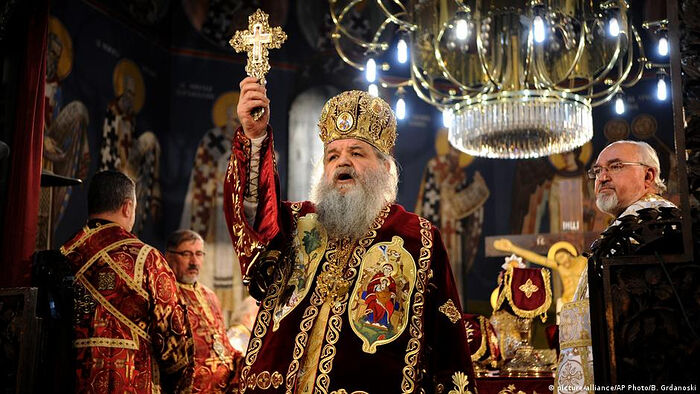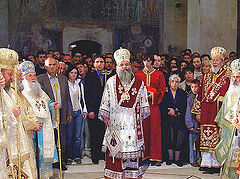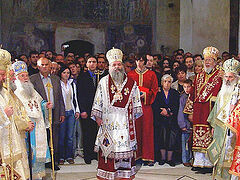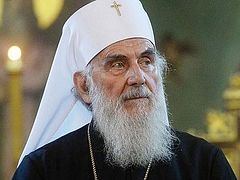Lovech, Bulgaria, and Moscow, May 11, 2022
 Abp. Stefan of Skopje. Photo: dw.com
Abp. Stefan of Skopje. Photo: dw.com
On Monday, the Holy Synod of the Patriarchate of Constantinople resolved to enter into communion with the Macedonian Orthodox church (MOC), under the name of the “Ohrid Archbishopric.”
According to the Synodal decision, it’s now up to the Serbian Orthodox Church to resolve its relationship with the MOC, which has been recognized as schismatic by the Orthodox world since it departed from the Serbian Church in 1967.
Just three days before the Constantinople Synod made its decision, the Serbian hierarch Bishop Fotije of Zvornik and Tuzla revealed that a Serbian delegation, including His Holiness Patriarch Porfirije, recently held a productive meeting with an MOC delegation, and that there is hope that the MOC could return to canonical unity with the Serbian Church as early as the latter’s Bishops’ Council set to be held this month.
Various outlets have published articles speculating either that the Serbian Church worked together with Constantinople and will announce its acceptance of the new decision, or, conversely, that Constantinople stepped in before the Serbian Church could possibly grant autocephaly to the MOC, thus asserting its honor and privileges as the First Throne of Orthodoxy, with exclusive rights to make decisions that affect the entire Orthodox Church.
Either way, the Serbian Church has yet to announce its position, though the MOC Synod said yesterday that talks with the Serbian Church will continue until its final status is established.
In the meantime, representatives of the Bulgarian and Russian Churches have stated their positions.
The MOC initially appealed to the Bulgarian Church in November 2017, before it turned to Constantinople, asking the Bulgarians to take on the role of its “Mother Church” and to help resolve its canonical status with the rest of the Orthodox world. The Bulgarian Synod responded favorably, though it later backed off as this clearly angered the Greek, Serbian, and Constantinople Churches. The MOC and North Macedonian politicians then began appealing to Constantinople.
His Eminence Metropolitan Gabriel of Lovech, one of the most authoritative hierarchs of the Bulgarian Orthodox Church offered comments for the Bulgarian outlet BNT, saying Constantinople’s latest move would “bring more trouble for the Orthodox Church.”
Met. Gabriel has unwaveringly stood with the canonical Ukrainian Orthodox Church against the trouble caused by Constantinople’s interference there in the past few years.
His Eminence reflected:
I don’t know what will happen; I don’t know how the Serbian Church and other Churches will react. But this is an occasion to intensify the schism. The Macedonian Orthodox Church has been under the jurisdiction of the Serbian Orthodox Church since the 1920s, and this is recognized by all Orthodox Churches around the world. Therefore, according to our rules and canons, the Serbian Orthodox Church had the right to grant autocephaly to the Macedonian Orthodox Church, or a Pan-Orthodox Council could do so.
“The Ecumenical Patriarchate has no more rights than any other Orthodox Church,” the Bulgarian hierarch emphasized.
His Eminence also disagrees with the idea that the church in North Macedonia is the historical successor to the ancient Ohrid Archbishopric. “If we agree with this, it means we’d lose much of our Church history,” he said.
Two representatives of the Russian Church’s Department for External Church Relations (DECR) have also commented on Constantinople’s decision.
On Monday, May 9, Archpriest Igor Yakimchuk, Secretary for Inter-Orthodox Relations, told RIA-Novosti that the Russian Church will follow the lead of the Serbian Church on this matter: “The position of the Russian Orthodox Church will, first of all, taking into account the Serbian Church’s approach to this matter, which we still recognize as having the exclusive canonical rights in North Macedonia.”
Yesterday, Archpriest Nikolai Balashov, the Deputy Chairman of the DECR, commented to TASS:
The Patriarchate of Constantinople, as in the case of Ukraine, has once again decided to act as the sole and self-appointed arbiter of the fate of the entire Orthodox world, the sole and indisputable arbiter on all Church issues, having committed a gross anti-canonical and politically motivated invasion of the competence of the Serbian Orthodox Church. However, the competent decision on the status of the Orthodox Church in the Republic of North Macedonia can only be made by the Serbian Patriarchate through its Bishops’ Council. Any decision taken without the participation of the Serbian Orthodox Church will not be recognized by the Russian Orthodox Church. I hope other Local Orthodox churches will not recognize it either.
And Metropolitan Leonid of Klin, head of the Russian Church’s controversial African Exarchate issued his own statement this afternoon, saying that by recognizing the Macedonian church, Constantinople continues to split the Orthodox world:
With maniacal persistence, Patriarch Bartholomew is trying to assert his right of primacy (read: egocentrism) and convince those who have little understanding of the international Church agenda. The Phanar follows in the wake of the Western political mainstream, destroying along the way everything that has been created for centuries and kept on the balance of faith in generally accepted spiritual, moral, and ethical aspects. It’s clear that his actions don’t have the slightest independence and are dictated by the wishes of those who have long set themselves the task of killing Orthodoxy by isolating it from the world coordinate system.
“Any decisions that entail far-reaching consequences for the One, Holy, Catholic, and Apostolic Church should be decided only together, by all Orthodox Local Churches,” the Metropolitan says. Pat. Bartholomew will have to answer for his actions to God, Met. Leonid warns.
Such statements were expected by the MOC, says its hierarch Metropolitan Timotej of Debar and Kichevo: “Of course, there are some Churches that will not agree. That’s why we’re looking for another way to be recognized by all, and not just by individual Orthodox Churches. This is our desire and prayer.”
Follow OrthoChristian on Twitter, Vkontakte, Telegram, WhatsApp, MeWe, and Gab!



